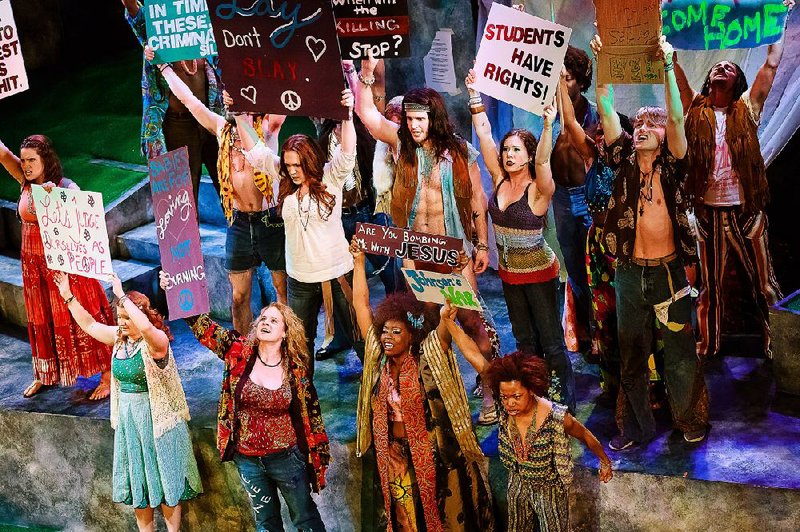The musical Hair, a big hit off and later on Broadway in the late 1960s, was a product of its time.
But the current touring production has a few “updates” that make it fresh, says director Charles Roy.
That includes the reintroduction by co-creator James Rado of two songs that fell out of production somewhere along the way and a new, grittier setting that gives it a contemporary tinge.
The show, onstage this week at Little Rock’s Robinson Center Music Hall, closes out Celebrity Attractions’ 2013-14 Broadway Season.
The story involves young Americans searching for peace and love, a “tribe” of politically active hippies in the “Age of Aquarius,” living a bohemian life in New York while fighting against conscription into the Vietnam War.
“You can’t change the lyrics, you can’t change the words,” Roy says. “They’re singing about the Vietnam War, so that should be retained.
“Has the look of the show changed? Yes, it has a very gritty aesthetic. There will be an absence of tie-dye in the show. The setting hasn’t changed, but the set has; it looks more like an abandoned industrial space, a real steel cage quality.
“As many people have said of the piece, it was written while America was at war, and in many ways the war hasn’t ended. Many of the issues are still current and still very relevant today.”
The young cast, put together out of auditions in Toronto, Chicago and New York for this new leg of the tour, has only been on the road for a couple of weeks, Roy says.
“It’s an augmented cast of Canadians and Americans,” he says. “What’s fun about this cast, and about the show, is that the actors all play their own instruments - our leads play the electric guitar, and they’re really skillful; there’s flute and trumpet and hand drums and percussion, so it’s a really dynamic and unique musical sound scape.
“It was a little tricky, because I couldn’t simply be happy with ‘triple threats’ [performers who can act,sing and dance], I had to have ‘quadruple threats.’ We had to do a bit of searching, but we came up with a pretty terrific company of actors.”
The performers are all in their late teens and 20s, “roughly the age of the characters in the show, which adds an authentic level to the performance,” Roy says. “They’ve really tapped into the desperation, the fear, they hurl themselves into the celebratory aspects of the show, into its joy and abandon and recklessness.
“It’s a really energetic production that feels very fresh,very raw, very honest and very true to the original spirit of the show. It very much has a rock-concert feel, a rock concert where a play breaks out in the middle of it, and I think people should be prepared for a really high-octane, visceral experience.”
Roy says Rado’s recent reworking of the show brings it back to its grittier roots, adding back two songs that have not been part of more recent Broadway versions.
“Dead End” in Act I is “sung by the African-American cast, about the particular obstacles they face,” Roy says.
And, in Act II, “Xanaplanetooch,” part of the original 1967 off-Broadway production that didn’t make it in the move to Broadway, is “a fantasia that the lead character, Claude, sings, about some utopia that he has imagined where there is no government, no crime, no war, no pollution, a ballad about what this world could be.
“‘Dead End’ was in the Broadway show but it’s fallen out of favor, so it hasn’t been commonly included in many years; every now and again, a university production will revive it.
“The other was cut as the show transferred from its off-Broadway tryout to Broadway in 1967-68, and hasn’t been seen in any production since.”
The show has been controversial since its debut, with adult language and adult themes, plus its depiction of drug use, sexuality at the dawn of the so-called “sexual revolution” and its irreverence for the American flag. Oh, and a famous nude scene.
However, by the request of the presenter, central Arkansas audiences will see the so-called “clean” version,which, though it is still recommended for mature audiences 15 and up, eliminates the nude scene and promises no “f-words.”
“That isn’t to say that the show has been watered down by any means, or that it has lost its provocative elements,” Roy says.
“The writing of the show, and it has been from the very inception, is openly critical of many aspects of American culture that are very sensitive: race, class, nationalism, warmongering and many things are examined very critically.
“It still has a lot of its power and rawness and will give people a lot to think about. In many ways, the nude scene is one of the least provocative numbers in the show.”
And the producers are actively encouraging audiences to sing along with the songs, “at the top of their lungs if they like,” Roy adds.
“It’s an interesting show in that it discourages conventional theater behavior, where people sit as passive observers, and they’re meant to participate a little bit, vocally if nothing else, and be a part of the greater experience. Which gives it an intimate and inclusive feel.”
Theater
Hair 7:30 p.m. Tuesday-Thursday, Robinson Center Music Hall, West Markham Street and Broadway. Celebrity Attractions. Music by Galt MacDermot, book and lyrics by Gerome Ragni and James Rado Tickets: $15-$50 (501) 244-8800; (800) 982-2787 CelebrityAttractions.com; Ticketmaster.com
Style, Pages 45 on 02/16/2014

